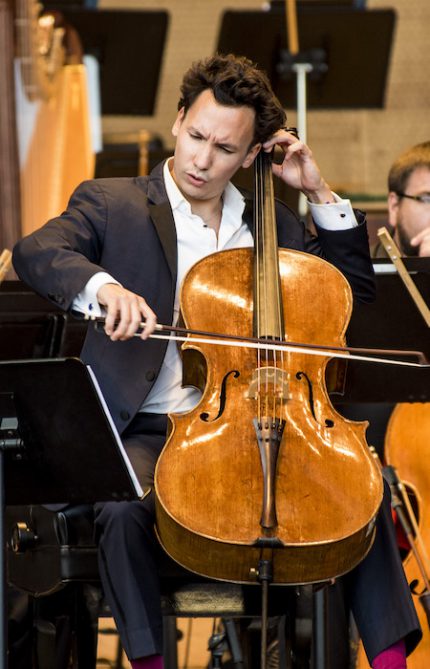Gulda’s eclectic concerto gets game advocacy from French cellist

Friedrich Gulda (1930-2000) was something of an eccentric and possessed of a restless musical mind.
One of the most formidable classical piano virtuosos of the past century, acclaimed for his interpretations of Bach, Mozart, Beethoven, and Debussy, the Viennese Gulda also embraced jazz and rock music. During the Second World War he gave jazz performances despite the Third Reich’s official ban on such practices. In midlife he took up playing the baritone saxophone, and also recorded vocal music under the assumed name of Alvin Golowin. He faked his own death in 1999—a year before his actual demise—to get a sense of what his posthumous publicity might look like. Ultimately it is for his peerless keyboard technique and insatiable musical appetite for which he is remembered.
Gulda was also a composer who wrote a modest number of works for solo piano and chamber ensemble, as well as a handful on a larger scale. His output is generally jazz inflected and inventive, manifesting his variegated musical background.
Those myriad musical affiliations are on full display in his Concerto for Cello and Wind Orchestra (1980), which received its Grant Park Music Festival premiere Wednesday night. Edgar Moreau was the solo protagonist with Cristian Măcelaru conducting the Grant Park Orchestra at the Pritzker Pavilion.
The thirty-minute work begins with an “Ouverture” in an aggressive bluesy vein, propelled by a driving drum set and modal harmonies. This alternates with a contrasting bucolic theme, and Moreau was equally compelling in the disparate sections.
The outer portions of the ensuing “Idylle” are expansive and lyrical, with a jaunty Austrian ländler at its center. Here Moreau projected the forthright solo lines with ample grace, and the Grant Park brass played with a burnished collective tone. An unaccompanied “Cadenza” follows, parts of which are not notated, allowing the French cellist an opportunity to improvise. Emergency sirens obliterated the movement’s opening moments, but once past that distraction its plaintive, searching quality came across. The solo section rises to frantic fever pitches high on the fingerboard, and there are even whiffs of Piazzolla’s tango nuevo toward the end. Here as throughout Moreau was in sync with the work’s mercurial character shifts.
The fourth movement—“Menuett”—is lilting and Sephardic, with strumming from the orchestral guitar prominent in the accompaniment. The closing “Finale alla Marcia” is a raucous oompah affair, evocative of a beerhall reel. The soloist plays in headlong perpetual motion, and Moreau dispatched these technical demands with ease. Măcelaru was an incisive leader, keeping the soloist and ensemble tautly unified.
After the rousing finale, an audience member remarked, “I’ve never heard anything like it!” Gulda’s opus is undeniably imaginative, but ultimately leaves the impression of pastiche. It is not immediately clear how or even whether the diverse movements hang together, and while each is undeniably characterful, they amount to exactly the sum of their parts when taken as a whole. Moreau and Măcelaru nonetheless deserve great credit for providing game advocacy to this inventive if insufficiently integrated work.
The balance of Wednesday’s intermission-less program was devoted to a timeless favorite, the Suite from Tchaikovsky’s Swan Lake. Măcelaru led an engaging performance that ably projected the collection of highlights from one of the enduringly great works for the dance stage.
Anne Bach’s sinuous oboe solo in the opening “Scène” launched the performance on solid ground. Măcelaru kept the ensuing “Valse” light on its feet, though the amplification at the Pritzker Pavilion seemed to elide some subtle dynamic variations he indicated. The atmosphere of the coquettish “Danse de Cygnes” also suffered from being blasted over the speakers.
Concertmaster Jeremy Black’s solo in the “Pas d’Action” was affecting and poised, and he and principal cellist Walter Haman were well matched in their closing duet. The set of dances—Hungarian, Spanish, Neapolitan—all went with unbridled esprit, rounded out by a boisterous “Mazurka.”
The urgency of the closing “Scène et Finale” captured the desperation of Odette and the Prince’s suicide at the end of the ballet, and Măcelaru emphasized the pivot to major in the final bars, conveying the lovers’ ultimate transcendence.
The Grant Park Orchestra’s next program takes place 6:30 p.m. Friday and 7:30 p.m. Saturday. David Danzmayr conducts Lopéz’s Fiesta! and Dvorak’s Symphony No. 7, with clarinetist Anthony McGill and flutist Demarre McGill performing Joel Puckett’s Concerto Duo and Saint-Saëns’ Tarantelle. grantparkmusicfestival.com
Posted in Performances
